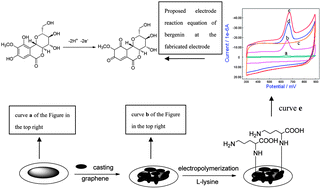Sensitive voltammetric sensor for bergenin based on poly(l-lysine)/graphene modified glassy carbon electrode
Abstract
A sensitive and novel electrochemical sensor for detection of

* Corresponding authors
a
College of Chemistry and Molecular Engineering, Zhengzhou University, Zhengzhou 450001, P. R. China
E-mail:
yebx@zzu.edu.cn
Fax: +86 0371 67763654
Tel: +86 0371 67781757
b Department of Chemistry and Chemical Engineering, Henan University of Urban Construction, Pingdingshan 467036, P. R. China
A sensitive and novel electrochemical sensor for detection of

 Please wait while we load your content...
Something went wrong. Try again?
Please wait while we load your content...
Something went wrong. Try again?
Y. Li, J. Liu, G. Song, K. Li, K. Zhang and B. Ye, Anal. Methods, 2013, 5, 3895 DOI: 10.1039/C3AY40531A
To request permission to reproduce material from this article, please go to the Copyright Clearance Center request page.
If you are an author contributing to an RSC publication, you do not need to request permission provided correct acknowledgement is given.
If you are the author of this article, you do not need to request permission to reproduce figures and diagrams provided correct acknowledgement is given. If you want to reproduce the whole article in a third-party publication (excluding your thesis/dissertation for which permission is not required) please go to the Copyright Clearance Center request page.
Read more about how to correctly acknowledge RSC content.
 Fetching data from CrossRef.
Fetching data from CrossRef.
This may take some time to load.
Loading related content
